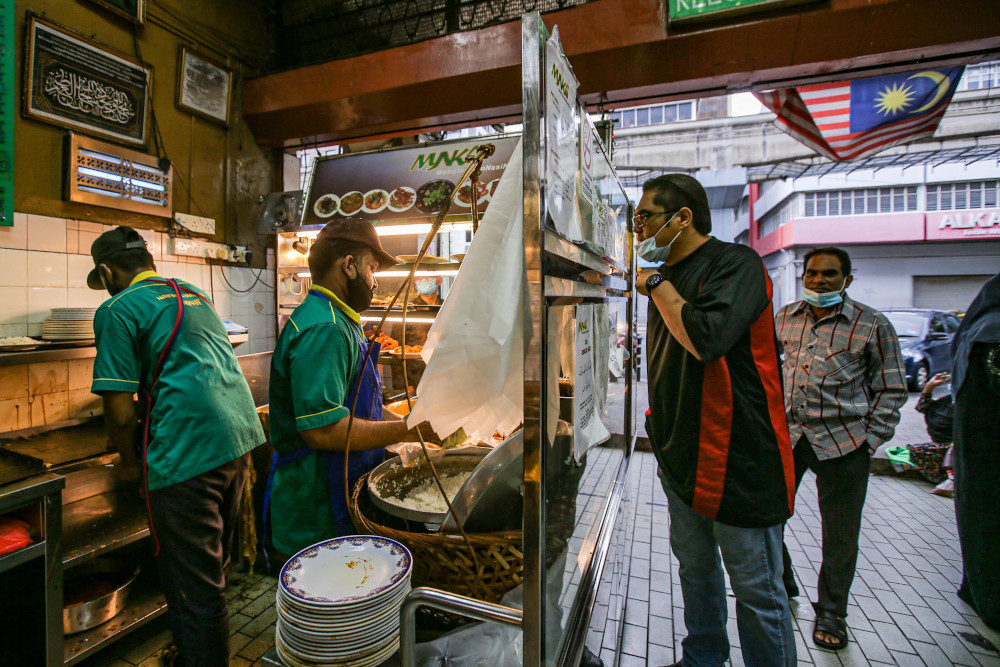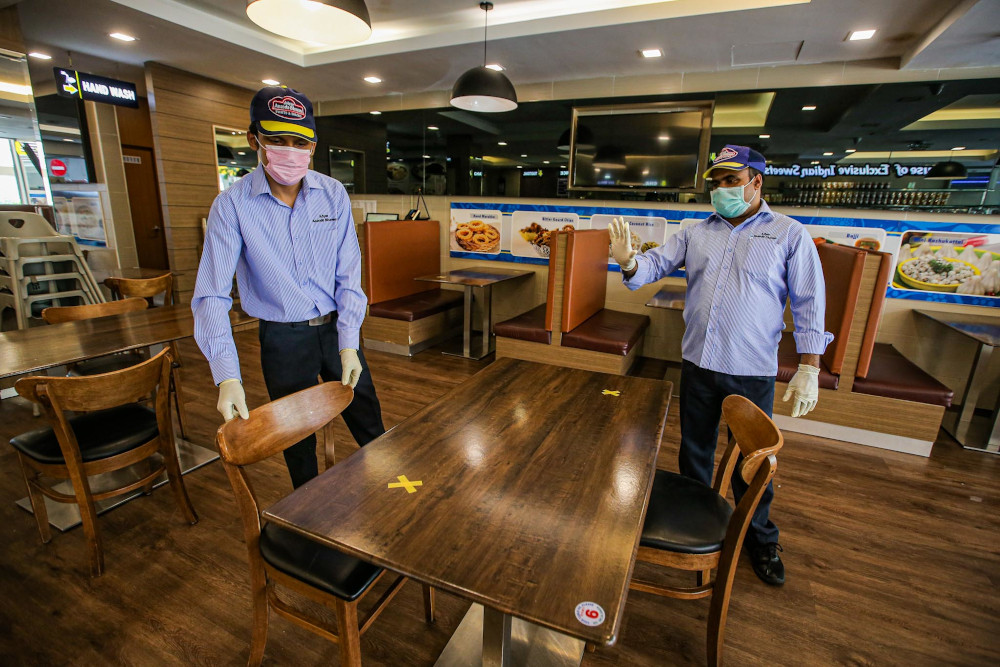KUALA LUMPUR, May 5 — Several of the city centre’s most renowned eateries have decided against resuming operations in full under the conditional movement control order (CMCO), which started yesterday.
During a survey by Malay Mail yesterday from breakfast time until the breaking fast period for Ramadan, eatery owners said doing so may draw crowds to their restaurants, defeating the purpose of putting in place social distancing standard operating procedures (SOP) in the first place.
Abdullah, who runs Indian-Muslim restaurant ABC Bistro Cafe at Selangor Mansion, said due to space constraints within the premises, he has decided not to put out any tables for dine-ins, sticking with takeaway orders instead.
“The restaurant does not have much space to have tables arranged for social distancing purposes.
“Also, we want to get some feedback from customers on whether they would prefer to dine-in or just takeaway and then we will make a decision.
“After all, we are in a red zone. I think people are still scared to come out,” he said when met by Malay Mail at the restaurant.
Yesterday was the first day restaurants within Selangor Mansion and Malayan Mansion resumed operations after an enhanced MCO (EMCO) was enforced in the area due to a spike in Covid-19 positive cases early last month.
Subsequently, areas within an 800 metre radius were slapped with the EMCO to contain the virus.
“So far, our regular customers have returned to buy food from us, but they are fine with takeaways,” Abdullah said.
He added that he was happy to return to work, but was also afraid of the risk and hopes that everyone will abide by the rules set to prevent spreading of the virus.
Located nearby ABC, the Mansion Tea Stall, famous for its roti canai banjir — topped with half-boiled eggs and drowned in curry — remained closed.
Protecting staff health
On Jalan Kamunting, popular Hainanese restaurant Yut Kee has also refrained from setting up tables for dine-in customers to protect its staff, owner Mervyn Lee said.
“We have been shut since March 31 when Menara City One was placed on lockdown because we are so near (about 300 metres).
“I have been able to keep my staff healthy and free of the virus, I don't want to risk them falling sick with welcoming customers to dine-in at the restaurant.
“Because we have a very high customer turnover, the risk of someone bringing the virus to the restaurant is very high too,” said Lee when met at the restaurant.
On a normal day, Yut Kee usually has about 15 diners in line waiting for a table. The eatery's revenue stream has taken a hit since the MCO was enforced on March 18, Lee said.
“The restaurant depends on high traffic and at the same time it is the high traffic that is what we need to avoid now. It is quite a challenging situation for us eatery owners.
“We are slowly recovering even though we're making only about 30 to 40 per cent of sales, but it's better than nothing,” he said.
The restaurant, famed for signature dishes such as roti babi (crab meat and mince pork toast), pork chop, roasted pork, curry chicken mee hoon and desserts such as butter cake and peanut roll has been pushing sales online and will continue to do so for the rest of the year, Lee said.
Too many people on the streets
Not far away, Syed Bistro too has decided to continue with its takeaway and delivery services.
The manager of the Indian-Muslim food outlet, known for its briyani, Abdullah Hakim, said he was terrified when he saw the number of people on the road today.
“Throughout the MCO, I have been delivering food and sometimes help with groceries delivery. The roads were very peaceful and easy for me to get around.
“Today there are so many people on the roads. It scared me to think that there could be people on the streets with the virus, bringing it to the restaurant.
“Also, because the government has made a ruling to say that if our staff fall sick, we will have to deal with it on our own, that is too much of a risk to take, especially with the high volume of our manpower (all outlets combined),” he said when met at Syed Bistro.
Over on Jalan Tuanku Abdul Rahman, Mohd Yaseem Nasi Kandar welcomed a long line of loyal customers, sans tables.
A few doors over, its rival Restoran Kudu bin Abdul, which is usually seen with a line of people snaking out to the corridor, remained closed.
Getting used to home dining
Regular customer TJ said since it was the fasting month, the crowd is significantly lesser compared to before.
“Because it is the fasting month, not so many people want to line up to get food.
“Today is my first time after many weeks refraining from coming here to avoid the crowd,” he said.
He added that he did not mind if this was the system restaurants practiced over the next six months as it was a safer option compared to eating at the restaurant.
“We have to accept that we no long can sit in a group to have our meals at the restaurant if this is what we need to do to eliminate the virus,” he said.
Another regular customer, Mohd Rizal, who works on Jalan Sultan Ismail, said it may be difficult getting used to this in the beginning, but after two months of staying at home, most people have gotten used to the idea of ordering in.
“I don't feel the need to go out to eat at a restaurant anymore, unless if there is food that we can't cook at home, I'd just go out and buy it, like nasi kandar.
“The Ramadan bazaar is convenient, but we have to move away from old thinking.
“Back in the day, we never had 24-hour restaurants, so it is really just about readjusting our lifestyle,” he said.
At Kampung Baru, the renowned Nasi Lemak Antarabangsa eatery too has opted against tables for the time being.
The owner, who declined to be named, said he remained unconvinced with the number of reported positive cases and wished to wait until it is truly safe to cater to dine-in customers.
“We have been doing takeaways since the beginning of MCO and we will keep it this way until there is convincing data from the government that it is totally safe.
“We have to be very careful especially since we are located in a red zone,” the restaurant owner said.
Meanwhile, workers at Adyar Ananda Bhavan at Masjid India resumed operations after staying shut for almost a month, with dining tables arranged following social distancing rules.
The South Indian vegetarian chain’s branch manager Eman Hossain said he was hoping that more customers will turn up tomorrow compared to the three they served yesterday.
To adhere to social distancing guidelines, restaurant staff have had to remove unused furniture from the outlet due to space constraints.
“We usually have 25 tables, but we have reduced to 16.
“We are also hoping that customers who dine-in will follow the regulations that we have put in place, including stating their personal information for contact tracing purposes should there any Covid-19 cases detected among our customers,” said Eman.
The latest number of new Covid-19 cases has decreased to two digits, with 55 new cases reported as of yesterday.
According to the Health Ministry, of the 55 cases, 48 were locally transmitted.






















